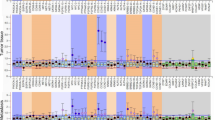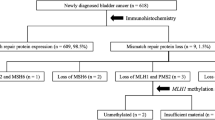Abstract
The present study aimed at detection ofP53 gene mutations in cells of urinary bladder neoplasms, as the mutations may be regarded as an independent prognostic factor for progression and recurrence of tumours. In the study, 82 patients with clinically diagnosed urinary bladder tumour were included. The control was composed of DNA samples from urine and blood of 202 healthy patients. Exons 5–8 of theP53 gene were screened for mutations by using multitemperature single-strand conformational polymorphism (MSSCP) analysis. Samples with abnormal MSSCP patterns were subjected to direct sequencing. The frequency of mutations in exons 5–8 of theP53 gene in patients with bladder cancer was lower (3.3% in grade G1, 24% in G2, and 39% in G3) than the data reported in the literature. We found a higher percentage of polymorphism at codon 213 of theP53 gene in bladder cancer patients (6%), compared with the values in the reference group (2.5%). These results were matched with those of the loss of heterozygosity (LOH) analysis. In conclusion, mutations were found mainly in more advanced histopathological and clinical stages of the disease and at the CIS stage (carcinoma in situ). It cannot be excluded that the observed polymorphism at codon 213 may be a predisposing factor for urinary bladder carcinoma development.
Similar content being viewed by others
References
Berggren P, Steineck G, Adolfsson J, Hansson J, Jansson O, Larsson P, et al. 2001. p53 mutations in urinary bladder cancer. Br J Cancer 84: 1505–1511.
Berggren P, Steineck G, Hemminki K, 2000. A rapid fluorescence-based multiplex polymerase chain reaction — single-strand onformation polymorphism method for p53 mutation detection. Electrophoresis 21: 2335–2342.
Cordon-Cardo C, 2001. Applications of molecular diagnostics: solid tumour genetics can determine clinical treatment protocols. Mod Pathol 14: 254–257.
Dahse R, Utting M, Werner W, Schimmel B, Claussen U, Junker K, 2002. TP53 alterations as a potential diagnostic marker in superficial bladder carcinoma and in patients’ serum, plasma and urine samples. Int J Oncol 20: 107–115.
Dalbagni G, Ren ZP, Herr H, Cordon-Cardo C, Reuter V, 2001. Genetic alterations in tp53 in recurrent urothelial cancer: a longitudinal study. Clin Cancer Res 7: 2797–2801.
Didkowska J, Wojciechowska U, Tarkowski W, 2002. Nowotwory złośliwe w Polsce w 1999 roku [Malignancies in Poland in 1999]. The Polish National Cancer Registry
Fiszer-Maliszewska L, Czernik J, Sawicz-Birkowska K, Perek D, Kozera M, Wojciechowska B, et al. 2000. Screening for germline p53 mutations in pediatric and adult patients of high-risk groups in Poland. Arch Immunol Ther Exp 48: 309–315.
Friedrich MG, Erbersdobler A, Schwaibold H, Conrad S, Huland E, Huland H, 2000. Detection of loss of heterozygosity in the p53 tumour-suppressor gene with PCR in the urine of patients with bladder cancer. JUrol 163: 1039–1042.
Friedrich MG, Riethdorf S, Erbersdobler A, Tiemer C, Schwaibold H, Solter JK, et al. 2001. Relevance of p53 gene alterations for tumour recurrence in patients with superficial transitional cell carcinoma of the bladder. Eur Urol 39: 159–166.
[GUS] Główny Urząd Statystyczny 2004. Rocznik Statystyczny Rzeczypospolitej Polskiej 2003. [Statistical Yearbook of the Republic of Poland 2004]. Warszawa: Zakład Wydawnictw Statystycznych.
Hainaut P, Hollstein M, 2000. p53 and human cancer: the first ten thousand mutations. Adv Cancer Res 77: 81–137.
Hartmann A, Schlake G, Zaak D, Hungerhuber E, Hofstetter A, Hofstaedter F, Knuechel R, 2002. Occurrence of chromosome 9 and p53 alterations in multifocal dysplasia and carcinoma in situ of human urinary bladder. Cancer Res 62: 809–818.
Hopman AH, Kamps MA, Speel EJ, Schapers RF, Sauter G, Ramaekers FC, 2002. Identification of chromosome 9 alterations and p53 accumulation in isolated carcinoma in situ of the urinary bladder versus carcinoma in situ associated with carcinoma. Am J Pathol 161: 1119–1125.
Jubb AM, Bell SM, Quirke P, 2001. Methylation and colorectal cancer. J Pathol 195: 111–134.
Kaczanowski R, Trzeciak L, Kucharczyk K, 2001. Multitemperature single-strand conformation polymorphism. Electrophoresis 22: 3539–3545.
LaRue H, Allard P, Simoneau M, Normand C, Pfister C, Moore L, et al. 2000. P53 point mutations in initial superficial bladder cancer occur only in tumours from current or recent cigarette smokers. Carcinogenesis 21: 101–106.
Loeb LA, Loeb KR, Anderson JP, 2003. Multiple mutations and cancer. Proc Natl Acad Sci USA 100: 776–781.
Lu ML, Wikman F, Orntoft TF, Charytonowicz E, Rabbani F, Zhang Z, 2002. Impact of alterations affecting the p53 pathway in bladder cancer on clinical outcome, assessed by conventional and array-based methods. Clin Cancer Res 8: 171–179.
Miller CW, Simon K, Aslo A, Kok K, Yokota J, Buys CH, et al. 1992. p53 mutations in human lung tumours. Cancer Res 52: 1695–1698.
Obermann EC, Junker K, Stoehr R, Dietmaier W, Zaak D, Schubert J, et al. 2003. Frequent genetic alterations in flat urothelial hyperplasias and concomitant papillary bladder cancer as detected by CGH, LOH, and FISH analyses. J Pathol 199: 50–57.
Olivier M, Eeles R, Hollstein M, Khan MA, Harris CC, Hainaut P, 2002. The IARC TP53 database: new online mutation analysis and recommendations to users. Hum Mutat 19: 607–614.
Osman I, Scher HI, Zhang ZF, Pellicer I, Hamza R, Eissa S, et al. 1997. Alterations affecting the p53 control pathway in bilharzial-related bladder cancer. Clin Cancer Res 3: 531–536.
Pfister C, Flaman JM, Martin C, Grise P, Frebourg T, 1999. Selective detection of inactivating mutations of the tumour suppressor gene p53 in bladder tumours. JUrol 161: 1973–1975.
Phillips HA, Howard GC, Miller WR, 2000. p53 mutations as a marker of malignancy in bladder washing samples from patients with bladder cancer. Br J Cancer 82: 136–141.
Prescott JL, Montie J, Pugh TW, McHugh T, Veltri RW, 2001. Clinical sensitivity of p53 mutation detection in matched bladder tumour, bladder wash, and voided urine specimens. Cancer 91: 2127–2135.
Sachs MD, Schlechte H, Lenk VS, Brenner S, Schnorr D, Fleige B, et al. 2000. Genetic analysis of Tp53 from urine sediment as a tool for diagnosing recurrence and residual of bladder carcinoma. Eur Urol 38: 426–433.
Shigyo M, Sugano K, Tobisu K, Tsukamoto T, Sekiya T, Kakizoe T, 2001. Molecular followup of newly diagnosed bladder cancer using urine samples. JUrol 166: 1280–1285.
Sidransky D, Von Eschenbach A, Tsai YC, Jones P, Summerhayes I, Marshall F, et al. 1991. Identification of p53 gene mutations in bladder cancers and urine samples. Science 252: 706–709.
Smith ND, Rubenstein JN, Eggener SE, Kozlowski JM, 2003. The p53 tumour suppressor gene and nuclear protein: basic science review and relevance in the management of bladder cancer. J Urol 169: 1219–1228.
Tiguert R, Lessard A, So A, Fradet Y, 2002. Prognostic markers in muscle invasive bladder cancer. World J Urol 20: 190–195.
Uchida T, Wada C, Ishida H, Wang C, Egawa S, Yokoyama E, et al. 1995. p53 mutations and prognosis in bladder tumours. J Urol 153: 1097–1104.
Williamson MP, Elder PA, Knowles MA, 1994. The spectrum of TP53 mutations in bladder carcinoma. Genes Chromosomes Cancer 9: 108–118.
Yoshimura I, Kudoh J, Saito S, Tazaki H, Shimizu N, 1995. p53 gene mutation in recurrent superficial bladder cancer. J Urol 153: 1711–1715.
Author information
Authors and Affiliations
Corresponding author
Rights and permissions
About this article
Cite this article
Borkowska, E., Binka-Kowalska, A., Constantinou, M. et al. P53 mutations in urinary bladder cancer patients from Central Poland. J Appl Genet 48, 177–183 (2007). https://doi.org/10.1007/BF03194676
Received:
Revised:
Accepted:
Issue Date:
DOI: https://doi.org/10.1007/BF03194676




